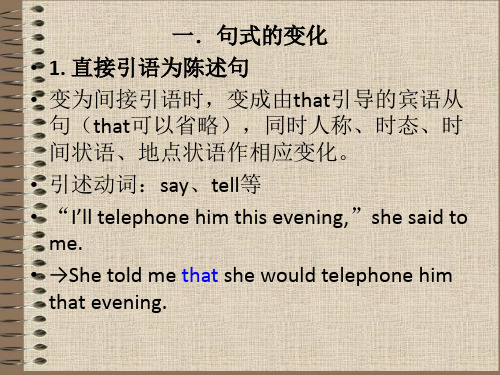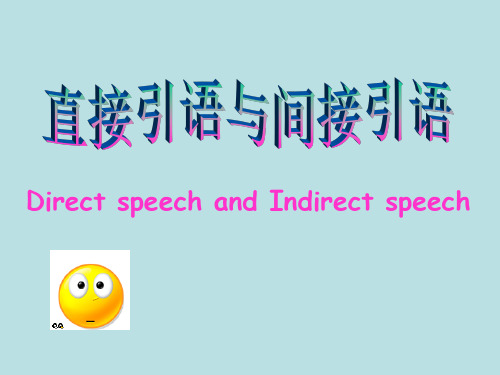直接引语变间接引语讲解课件
合集下载
直接引语变间接引语经典课件

总之:人称的变 化要符合逻辑!
直接引语→间接引语:时态的变化 (1) 一般现在时变为一般过去时 (2) 现在进行时变为过去进行时
(3) 一般将来时变为过去将来时
(4) 现在完成时变为过去完成时
(5) 一般过去时变为过去完成时
(6) 过去完成时不变,仍为过去完成时
时态不变化:
①直接引语是客观真理 “The moon moves around the earth”, the teacher told me. → The teacher told me the moon moves around the earth. ②直接引语是过去进行时,时态不变 Jack said, “John, where were you going when I met you in the street?” →Jack asked John where he was going when he met him in the street.
“You have finished the homework, haven’t you?” my mother asked. →My mother asked me whether I had finished the homework.
③直接引语如果是特殊问句,间接引语应该 改为由疑问代词或疑问副词引导的宾语从句 (宾语从句必须用陈述句语序)。 She asked me, “When do they have their dinner?” → She asked me when they had their dinner.
“Do you like singing?”
What did he say
?
He asked
直接引语变间接引语-公开课37页PPT

43、重复别人所说的话,只需要教育; 而要挑战别人所说的话,则需要头脑。—— 玛丽·佩蒂博恩·普尔
44、卓越的人一大优点是:在不利与艰 难的遭遇里百折不饶。——贝多芬
45、自己的饭量自己知道。——苏联
直接Байду номын сангаас语变间接引语-公开课
41、实际上,我们想要的不是针对犯 罪的法 律,而 是针对 疯狂的 法律。 ——马 克·吐温 42、法律的力量应当跟随着公民,就 像影子 跟随着 身体一 样。— —贝卡 利亚 43、法律和制度必须跟上人类思想进 步。— —杰弗 逊 44、人类受制于法律,法律受制于情 理。— —托·富 勒
45、法律的制定是为了保证每一个人 自由发 挥自己 的才能 ,而不 是为了 束缚他 的才能 。—— 罗伯斯 庇尔
41、学问是异常珍贵的东西,从任何源泉吸 收都不可耻。——阿卜·日·法拉兹
42、只有在人群中间,才能认识自 己。——德国
44、卓越的人一大优点是:在不利与艰 难的遭遇里百折不饶。——贝多芬
45、自己的饭量自己知道。——苏联
直接Байду номын сангаас语变间接引语-公开课
41、实际上,我们想要的不是针对犯 罪的法 律,而 是针对 疯狂的 法律。 ——马 克·吐温 42、法律的力量应当跟随着公民,就 像影子 跟随着 身体一 样。— —贝卡 利亚 43、法律和制度必须跟上人类思想进 步。— —杰弗 逊 44、人类受制于法律,法律受制于情 理。— —托·富 勒
45、法律的制定是为了保证每一个人 自由发 挥自己 的才能 ,而不 是为了 束缚他 的才能 。—— 罗伯斯 庇尔
41、学问是异常珍贵的东西,从任何源泉吸 收都不可耻。——阿卜·日·法拉兹
42、只有在人群中间,才能认识自 己。——德国
直接引语和间接引语(19张PPT)初中英语专项复习课件

直接引语变间接引语
一、直接引语&间接引语 – 定义 二、句子结构变化规则 三、语序变化规则 四、人称变化规则 五、时态变化规则 六、指代状动变化规则
一、直接引语 间接引语 -- 定义
直接引语:引用别人的原话; Peter said “ Jack is a Bully!” 间接引语:用自己的话转述别人的话(宾语从句) Peter said that Jack was a Bully.
She said, “ I broke your phone.” She said that she _h_a_d_b_r_o_k_e_n my phone.
现在完成时→ 过去完成时
She said, “ He has gone home.” She said that he __h_a_d_g_o_n_e__ home.
go take have to
六、指代状动变化规则
5变: 指代状动
指示代词 时间状语 地点状语
this→that; these→those
now→then; today→that day; yesterday→the day before last week→the week before; tomorrow→the next day
一般现在时→ 一般过去时
He said, “ I know it.” He said that hek_n_e_w it.
现在进行时→ 过去进行时
He said, “ I am drinking milk.” He said that he _w_a_s_d_r_in_k_i_ng_ milk.
一般过去时→过去完成时
• 4.The teacher said, “The sun is bigger than the moon.”
一、直接引语&间接引语 – 定义 二、句子结构变化规则 三、语序变化规则 四、人称变化规则 五、时态变化规则 六、指代状动变化规则
一、直接引语 间接引语 -- 定义
直接引语:引用别人的原话; Peter said “ Jack is a Bully!” 间接引语:用自己的话转述别人的话(宾语从句) Peter said that Jack was a Bully.
She said, “ I broke your phone.” She said that she _h_a_d_b_r_o_k_e_n my phone.
现在完成时→ 过去完成时
She said, “ He has gone home.” She said that he __h_a_d_g_o_n_e__ home.
go take have to
六、指代状动变化规则
5变: 指代状动
指示代词 时间状语 地点状语
this→that; these→those
now→then; today→that day; yesterday→the day before last week→the week before; tomorrow→the next day
一般现在时→ 一般过去时
He said, “ I know it.” He said that hek_n_e_w it.
现在进行时→ 过去进行时
He said, “ I am drinking milk.” He said that he _w_a_s_d_r_in_k_i_ng_ milk.
一般过去时→过去完成时
• 4.The teacher said, “The sun is bigger than the moon.”
直接引语变间接引语[课件]
![直接引语变间接引语[课件]](https://img.taocdn.com/s3/m/4d29a028453610661ed9f417.png)
• →He
I often him sing .
• Mother said to me, “Can you go shopping with me?”
• →Mother me
I go shopping with
.
• Tom asked, “Lucy, did you hand in your homework?”
1、直接引语如果是陈述句,变为间接引语时注意: ①不用引号,而用连接词that,但有时可省略。 ②人称作相应变化; ③主句里的动词如果是过去时,在间接引语中作相应改变:
如:He says,"I am from the USA.” →He says that he is from the USA. Mr Smith said to his girl friend,“ I haven’ t seen
→Lily asked Miss Green if it was made in China. 3、直接引语如果是特殊疑问句,变为间接引语时,需用疑
问词引导, 词序是:连词+主语+谓语。 Lucy said to me, “How can I help?” →Lucy asked me how she could help. 4、直接引语如是祈使句,变间接引语时,须变为动词不定 式,并在动词不定式前用tell, ask, order. He said to the boy,“ Come here,young man! ” →He asked the boy to go there.
• 1.She said to me, “I broke your CD player.” • →She told me that she had broken my CD
直接引语变间接引语(完整)PPT课件

CHENLI
17
二、间接叙述转换为直接叙述
(1)改标点,改逗号为冒号,添加引号。 (2)改人称如果转述内容中是第三人称“他 (她)”或“他(她)们”,应改为“我”或 我(们)”;如果在转换时遇到一个句子中有两个 第一人称“我”时,应改后面的一个“我”为第二 人称“你”。
CHENLI
18
例:姐姐说,她明天送给我一件生日礼物。 改为:姐姐说:“我明天送给你一件生日礼物。
9、老师对王小宁说:“我有事,你组 织同学们继续完成制作。”
10、王明再也忍不住了,抢着对老班长 说:“我帮你一起找,我找得见。”
CHENLI
16
8、老师严厉地对小敏说,他必须把教室打扫干净。
9、老师对王小宁说,他有事,王小宁组织同学们继续 完成制作。
10、李明再也忍不住了,抢着对老班长说,他我帮老班 长一起找,他找得见。
CHENLI
19
1、妈妈问小宁他昨天去了哪里,她找了 他一整天。
妈妈问小宁:“你昨天去了哪里?我找 了你一整天。”
2、小方说,不行,他的字写得不够好, 应该让小宇去参加比赛。
小方说:“不行,我的字写得不够好,
应该让小宇去参加比赛。”CHENLI
20
3、王兰告诉我,我作文比赛得了一等奖。
4、王刚对李明说,他的鞋破了,脚掌也 出血了,他实在走不动,让李明自己先 走吧!
CHENLI
21
3、王兰告诉我,我作文比赛得了一等奖。
王兰告诉我:“你作文比赛得了一等奖。”
4、王刚对李明说,他的鞋破了,脚掌也 出血了,他实在走不动,让李明自己先 走吧!
王刚对李明说:“我的鞋破了,脚掌也
出血了,我实在走不动,你自己先走吧!”
CHENLI
直接引语与间接引语最全课件

主句为过去的某种时态,直接引语变为间接引语时, 时态要发生变化
Nina told me,“Lisa is studying abroad.” → Nina told me that Lisa was studying abroad. Nell said,“I have worked out this problem.” → Nell said (that) she had worked out that
一般现在时 一般将来时 一般过去时 现在进行时 现在完成时 过去完成时 现在完成进行时
can may must
间接引语 一般过去时 过去将来时 过去完成时 过去进行时 过去完成时 过去完成时 过去完成进行时
could might must/had to
Practice
二.人称的变化
• 直接引语中的人称代词转化为间接引语时变化原 则:一随主,二随宾,第三人称不更新。
• They told Mary,“We will help you out of trouble.” • They told Mary that they will help her out of trouble.
一.句式的变化
• 1. 直接引语为陈述句 • 变为间接引语时,变成由that引导的宾语从
句(that可以省略),同时人称、时态、时 间状语、地点状语作相应变化。
• 引述动词:say、tell等 • “I’ll telephone him this evening,”she said to
me.
• →She told me that she would telephone him that evening.
5. She asked me, "When do they have their dinner?"
Nina told me,“Lisa is studying abroad.” → Nina told me that Lisa was studying abroad. Nell said,“I have worked out this problem.” → Nell said (that) she had worked out that
一般现在时 一般将来时 一般过去时 现在进行时 现在完成时 过去完成时 现在完成进行时
can may must
间接引语 一般过去时 过去将来时 过去完成时 过去进行时 过去完成时 过去完成时 过去完成进行时
could might must/had to
Practice
二.人称的变化
• 直接引语中的人称代词转化为间接引语时变化原 则:一随主,二随宾,第三人称不更新。
• They told Mary,“We will help you out of trouble.” • They told Mary that they will help her out of trouble.
一.句式的变化
• 1. 直接引语为陈述句 • 变为间接引语时,变成由that引导的宾语从
句(that可以省略),同时人称、时态、时 间状语、地点状语作相应变化。
• 引述动词:say、tell等 • “I’ll telephone him this evening,”she said to
me.
• →She told me that she would telephone him that evening.
5. She asked me, "When do they have their dinner?"
高一英语直接引语与间接引语知识精讲PPT课件.ppt

❖ (二)转换方法: ❖ A. 直接引语是陈述句时,改成间接引语要作人称、
时态、时间状语、地点状语、指示代词、动词、呼 语等方面的变化。 ❖ 1. 人称的变化,包括人称代词、物主代词、反身代 词等。
❖ He said , “ I’ve left my book in your room . ” ❖ 他说:“我把我的书落在了你的房间。”
❖ (1)They said , “ we are having an exam now . ” 他们说, “我们正在考试。”
❖ They said that they were having an exam then . 他们说 那时他们正在考试。
❖ (2)John told me , “ About 5,000 people went to the concert yesterday . ”
❖ ▲ 没有间接宾语的,可以加一个间接宾语。 如me,him等。
❖▲ 从句用陈述语序。 ❖eg .(1)He said , “ Do you
understand ? ” ❖他问,“你理解吗?”
❖ He asked me if / whether I understood .
❖他问我是否我理解了。
❖ (2)He asked me , “ Which part of China impresses you most ? ”
❖ (3)tonight→that night (4)this week→that week
❖ (5)yesterday→the day before (6)yesterday evening→the evening before
❖ (7)last week→the week before (8)three days ago→three days before
时态、时间状语、地点状语、指示代词、动词、呼 语等方面的变化。 ❖ 1. 人称的变化,包括人称代词、物主代词、反身代 词等。
❖ He said , “ I’ve left my book in your room . ” ❖ 他说:“我把我的书落在了你的房间。”
❖ (1)They said , “ we are having an exam now . ” 他们说, “我们正在考试。”
❖ They said that they were having an exam then . 他们说 那时他们正在考试。
❖ (2)John told me , “ About 5,000 people went to the concert yesterday . ”
❖ ▲ 没有间接宾语的,可以加一个间接宾语。 如me,him等。
❖▲ 从句用陈述语序。 ❖eg .(1)He said , “ Do you
understand ? ” ❖他问,“你理解吗?”
❖ He asked me if / whether I understood .
❖他问我是否我理解了。
❖ (2)He asked me , “ Which part of China impresses you most ? ”
❖ (3)tonight→that night (4)this week→that week
❖ (5)yesterday→the day before (6)yesterday evening→the evening before
❖ (7)last week→the week before (8)three days ago→three days before
直接引语变间接引语讲解课件

转换的基本原则
准确转述
用自己的语言准确转述 说话人的意思,不改变
原意。
调整时态
根据上下文语境,调整 时态以符合整体语境。
调整人称
根据需要,将直接引语 中的第一人称或第二人
称转换为第三人称。
去除无关细节
去除直接引语中与主要 信息无关的细节,使转
述更加简洁明了。
02
CATALOGUE
直接引语变间接引语的步骤
标点符号的转换
01
直接引语中的冒号和双引号需转 换为间接引语中的逗号和单引号 。
02
例如:“I will go to the park tomorrow.” -> He said that he would go to the park the next day.
人称代词的转换
直接引语中的第一人称代词需转换为 第三人称代词。
详细描述
在直接引语转变为间接引语的过程中,标点符号的使用需要特别注意。例如, “他说‘我明天去北京’”应该使用逗号变为“他说,明天他要去北京”。
语序混乱
总ቤተ መጻሕፍቲ ባይዱ词
在将直接引语转变为间接引语时,语序 混乱也是一个常见错误。
VS
详细描述
在直接引语中,原话的语序可能是倒装、 前置等,但在转变为间接引语时,需要按 照正常的语序进行排列,以保持句子的通 顺性和逻辑性。例如,“明天你去北京吗 ?”应该转变为“他问是否明天去北京” 。
04
CATALOGUE
练习与巩固
单句改写
详细描述:从简单的单句开始练 习,逐步掌握直接引语变间接引 语的规则和技巧,如时态、语序 、人称等方面的变化。
例子
原句:他说:“我喜欢吃苹果。 ”
直接引语转间接引语ppt课件

→ The boy told us that he usually gets up at six every
morning.
1.The interviewer asked Detective Lu , ‘Why did you become a detective last year?’ The interviewer asked Detective Lu why he had become a detective the year before.
2.‘Where did you go two days ago?’ Lily asked Lucy. Lily asked Lucy where she had been two days before.
3.‘Will you go to see a film with me tomorrow?’ Sam asked Dick. Sam asked Dick whether/if he would go to see a film with him the following day/the next day.
直接引语转间接引语
1、时态变化:
2、人称变化:一主、二宾、三不变
3、时间状语和地点状语变化 4、指示代词、情态动词 5、 句子类化:
一般现在时 现在进行时 一般将来时
一般过去时 过去进行时 过去将来时
现在完成时
过去完成时
一般过去时
过去完成时
10.‘Light travels faster than sound.’ said the teacher. The teacher said that light travels faster than sound.
1. She said to Tom, ‘Can you help me?’ 2. She asked, ‘Is this book yours or his?’ 3. The teacher asked, ‘how did you repair it?’ 4. The teacher said to the students, ‘Don’t waste your time.’ 5. The mother said, ‘Tom, get up early, please.’ 6. ‘Will you go to the concert with me this evening?’ Mary asked me. 7. ‘What did you do yesterday?’ the old man asked my brother. 8. The engineer said, ‘I was at college in 1967.’ 9. ‘Where does your chemistry teacher live, Karen?’ the young man asked. 10. ‘Why were you late yesterday morning?’ His teacher asked.
morning.
1.The interviewer asked Detective Lu , ‘Why did you become a detective last year?’ The interviewer asked Detective Lu why he had become a detective the year before.
2.‘Where did you go two days ago?’ Lily asked Lucy. Lily asked Lucy where she had been two days before.
3.‘Will you go to see a film with me tomorrow?’ Sam asked Dick. Sam asked Dick whether/if he would go to see a film with him the following day/the next day.
直接引语转间接引语
1、时态变化:
2、人称变化:一主、二宾、三不变
3、时间状语和地点状语变化 4、指示代词、情态动词 5、 句子类化:
一般现在时 现在进行时 一般将来时
一般过去时 过去进行时 过去将来时
现在完成时
过去完成时
一般过去时
过去完成时
10.‘Light travels faster than sound.’ said the teacher. The teacher said that light travels faster than sound.
1. She said to Tom, ‘Can you help me?’ 2. She asked, ‘Is this book yours or his?’ 3. The teacher asked, ‘how did you repair it?’ 4. The teacher said to the students, ‘Don’t waste your time.’ 5. The mother said, ‘Tom, get up early, please.’ 6. ‘Will you go to the concert with me this evening?’ Mary asked me. 7. ‘What did you do yesterday?’ the old man asked my brother. 8. The engineer said, ‘I was at college in 1967.’ 9. ‘Where does your chemistry teacher live, Karen?’ the young man asked. 10. ‘Why were you late yesterday morning?’ His teacher asked.
直接引语变为间接引语ppt课件

直接引语为一般疑问句时,间接引语中用 whether或if引导;直接引语为特殊问句时,间 接引语中仍用原来的疑问词。
从使用情况来看,闭胸式的使用比较 广泛。 敞开式 盾构之 中有挤 压式盾 构、全 部敞开 式盾构 ,但在 近些年 的城市 地下工 程施工 中已很 少使用 ,在此 不再说 明。
For example:
For example: 1. "Open the door,please."She said.
She asked me to open the door.
2. It says,"No smoking here." It told us not to smoke there.
从使用情况来看,闭胸式的使用比较 广泛。 敞开式 盾构之 中有挤 压式盾 构、全 部敞开 式盾构 ,但在 近些年 的城市 地下工 程施工 中已很 少使用 ,在此 不再说 明。
时态的变化
当主句是过去时时,从句要得变为相应的过去时态, 变化规律如下:
一般现在时—— 一般过去时 一般过去时—— 过去完成时 一般将来时—— 过去将来时 现在进行时—— 过去进行时 现在完成时—— 过去完成时 过去完成时—— 过去完成时(时态不变) 过去进行时—— 过去进行时(时态不变)
从使用情ቤተ መጻሕፍቲ ባይዱ来看,闭胸式的使用比较 广泛。 敞开式 盾构之 中有挤 压式盾 构、全 部敞开 式盾构 ,但在 近些年 的城市 地下工 程施工 中已很 少使用 ,在此 不再说 明。
English teacher. 另外注意直接引语为复数,引述者主语为单数,间接引语主语相应变复
数。如: He said,“Are you interested in English?”→He asked me/us if I
从使用情况来看,闭胸式的使用比较 广泛。 敞开式 盾构之 中有挤 压式盾 构、全 部敞开 式盾构 ,但在 近些年 的城市 地下工 程施工 中已很 少使用 ,在此 不再说 明。
For example:
For example: 1. "Open the door,please."She said.
She asked me to open the door.
2. It says,"No smoking here." It told us not to smoke there.
从使用情况来看,闭胸式的使用比较 广泛。 敞开式 盾构之 中有挤 压式盾 构、全 部敞开 式盾构 ,但在 近些年 的城市 地下工 程施工 中已很 少使用 ,在此 不再说 明。
时态的变化
当主句是过去时时,从句要得变为相应的过去时态, 变化规律如下:
一般现在时—— 一般过去时 一般过去时—— 过去完成时 一般将来时—— 过去将来时 现在进行时—— 过去进行时 现在完成时—— 过去完成时 过去完成时—— 过去完成时(时态不变) 过去进行时—— 过去进行时(时态不变)
从使用情ቤተ መጻሕፍቲ ባይዱ来看,闭胸式的使用比较 广泛。 敞开式 盾构之 中有挤 压式盾 构、全 部敞开 式盾构 ,但在 近些年 的城市 地下工 程施工 中已很 少使用 ,在此 不再说 明。
English teacher. 另外注意直接引语为复数,引述者主语为单数,间接引语主语相应变复
数。如: He said,“Are you interested in English?”→He asked me/us if I
直接引语与间接引语ppt最全课件

problem.
经营者提供商品或者服务有欺诈行为 的,应 当按照 消费者 的要求 增加赔 偿其受 到的损 失,增 加赔偿 的金额 为消费 者购买 商品的 价款或 接受服 务的费 用
2024/2/17
直接引语 一般现在时 一般将来时 一般过去时 现在进行时 现在完成时 过去完成时 现在完成进行时
can may must
经营者提供商品或者服务有欺诈行为 的,应 当按照 消费者 的要求 增加赔 偿其受 到的损 失,增 加赔偿 的金额 为消费 者购买 商品的 价款或 接受服 务的费 用
二.人称的变化
• 直接引语中的人称代词转化为间接引语时变化原 则:一随主,二随宾,第三人称不更新。
• They told Mary,“We will help you out of trouble.” • They told Mary that they will help her out of trouble.
Practice
• She said. "My brother wants to go with me." • He said to Kate. "How is your sister now?" • Mr. Smith said: "Jack is a good worker。"
经营者提供商品或者服务有欺诈行为 的,应 当按照 消费者 的要求 增加赔 偿其受 到的损 失,增 加赔偿 的金额 为消费 者购买 商品的 价款或 接受服 务的费 用
here come bring
there go take
经营者提供商品或者服务有欺诈行为 的,应 当按照 消费者 的要求 增加赔 偿其受 到的损 失,增 加赔偿 的金额 为消费 者购买 商品的 价款或 接受服 务的费 用
经营者提供商品或者服务有欺诈行为 的,应 当按照 消费者 的要求 增加赔 偿其受 到的损 失,增 加赔偿 的金额 为消费 者购买 商品的 价款或 接受服 务的费 用
2024/2/17
直接引语 一般现在时 一般将来时 一般过去时 现在进行时 现在完成时 过去完成时 现在完成进行时
can may must
经营者提供商品或者服务有欺诈行为 的,应 当按照 消费者 的要求 增加赔 偿其受 到的损 失,增 加赔偿 的金额 为消费 者购买 商品的 价款或 接受服 务的费 用
二.人称的变化
• 直接引语中的人称代词转化为间接引语时变化原 则:一随主,二随宾,第三人称不更新。
• They told Mary,“We will help you out of trouble.” • They told Mary that they will help her out of trouble.
Practice
• She said. "My brother wants to go with me." • He said to Kate. "How is your sister now?" • Mr. Smith said: "Jack is a good worker。"
经营者提供商品或者服务有欺诈行为 的,应 当按照 消费者 的要求 增加赔 偿其受 到的损 失,增 加赔偿 的金额 为消费 者购买 商品的 价款或 接受服 务的费 用
here come bring
there go take
经营者提供商品或者服务有欺诈行为 的,应 当按照 消费者 的要求 增加赔 偿其受 到的损 失,增 加赔偿 的金额 为消费 者购买 商品的 价款或 接受服 务的费 用
直接引语变间接引语PPT精华版

today变为 that day
He said, “I want to go swimming now. ”
→ He said he wanted to go swimming then. 地点状语,尤其表示方向性的, here 变 there
The teacher said ,“ You should come here at 7:00.”
2. 直接引语如果是疑问句,变为间接引语时,要 把疑问句语序改为陈述句语序。 1)一般疑问句。用whether或if引导。主句中的动词是said时改为asked,没有间接宾语的,可以加一个间接宾 语。 Eg. He said, “Are you a student?” Eg. “Are you sorry for what you have done?”the mother asked the boy.
→ He said that he was afraid he couldn‘t finish that work.
过去进行时
→ He said that he was eating an apple.
过去将来时
Tom told me that he would go to Shanghai the next week.
1. 陈述句 直接引语如果是陈述句,变为间接引语时,用连词that引导(that在பைடு நூலகம்语中常省略) 一般现在时
He said, “I‘m afraid I can’t finish this work.”
现在进行时 He said, “I'm eating an apple.”
一般过去时
一般将来时 Tom said to me “I’ll go to Shanghai next week”
He said, “I want to go swimming now. ”
→ He said he wanted to go swimming then. 地点状语,尤其表示方向性的, here 变 there
The teacher said ,“ You should come here at 7:00.”
2. 直接引语如果是疑问句,变为间接引语时,要 把疑问句语序改为陈述句语序。 1)一般疑问句。用whether或if引导。主句中的动词是said时改为asked,没有间接宾语的,可以加一个间接宾 语。 Eg. He said, “Are you a student?” Eg. “Are you sorry for what you have done?”the mother asked the boy.
→ He said that he was afraid he couldn‘t finish that work.
过去进行时
→ He said that he was eating an apple.
过去将来时
Tom told me that he would go to Shanghai the next week.
1. 陈述句 直接引语如果是陈述句,变为间接引语时,用连词that引导(that在பைடு நூலகம்语中常省略) 一般现在时
He said, “I‘m afraid I can’t finish this work.”
现在进行时 He said, “I'm eating an apple.”
一般过去时
一般将来时 Tom said to me “I’ll go to Shanghai next week”
英语:直接引语变间接引语课件

随 称变间引后与主 “ you must get she must get up
宾 句宾语的人称保 up early”
Hale Waihona Puke early持一致第三 人称 不用 变
引号内的第三人 称在变间引后去人 称不变
She said to me , “ They want to help him”
She told me that they wanted help him
4. This morning he said,” I’m leaving for Beijing tomorrow.” This morning he said that he was leaving for Beijing tomorrow.
直接引语转为间接引语时,下列情况下时态不变
1. 直接引语若表示的是客观事实或真理时, 变间接引语时时态不变.
Direct speech and Indirect speech
He says,“I leave my book in your room” He said that he left his book in your room.
直接引语: 直接引述别人的原话 间接引语: 用自己的话转述别人的话
间接引语在多数情况下构成宾语从句
5. He said, “they are playing games over there?” He said that they___w__e_re_ playing games over there.
直接引语时态 一般现在时 现在进行时 现在完成时 一般过去时 过去完成时 一般将来时
间接引语时态 一般过去时 过去进行时 过去完成时 过去完成时 不变 过去将来时
经典直接引语变间接引语[课件]
![经典直接引语变间接引语[课件]](https://img.taocdn.com/s3/m/fd0441b93169a4517723a3eb.png)
• →Tom asked Lucy if homework.
had handed in
• Bill said to Bob, “Do you agree with me?”
• →Bill
Bob
agreed with .
一般问句
• He said, “Do you often hear him sing?”
last week/month/year → the week/month/year before
three days (a year) ago → three days (a year) before
tomorrow
→ the next/following day
the day after tomorrow → two days later
you for a long time.” →Mr Smith said to his girl friend that he had not seen her for a long time.
直接引语改变为间接引语
2、直接引语如果是一般疑问句,变为间接引语时,需用从 属连接词whether或if引导,词序要改变。 Lily said to Miss Green, "Is it made in China?”
• 1.She said to me, “I broke your CD player.” • →She told me that she had broken my CD
player. • 2.He said to her, “I broke your CD player.” • →He told her that he had broken her CD player. •
四年级下册语文课件:直接引语改为间接引语全国通用(7页PPT)

• 鲁肃对我说,都是我自找的,他帮不了我的忙。 把三代、表 较A为的复人杂称句代子词的改转为换第三人称(他或他们),
妈例妈6:对姑小娘明对说孩,子放们学说后:,“她我来可接以小喝明你。们井里的水吗?”
例改为3::老老师师对对小我明说说,:他“来我帮来助帮我助。你。
• 4、老师对小王说:“我有事,你继续组织学生学习。”
摸索这种转述句的变化规律后,总结这种转述的方法为: A对B说:“代表A的人称代词......代表B的人称代词......” 把代表A的人称代词改为第三人称(他或他们), 代表B的人称代词改为 B 的名字。
三、较为复杂句子的转换
• 当有三个人称时,代表第三个人物的人称代词用 原名 表示。
例 3:老师对小明说:“我来帮助你。 改为:老师对我说,他来帮助我。 A对B说:“代表A的人称代词.
二、稍微复杂句子的转换
• 当所引述的话里有第二人称时,需要根据语境不同调整人称
• 例 3:老师对小明说:“我来帮助你。” • 改为:老师对小明说,他来帮助小明。
• 例 4:老师对我说:“我来帮助你。” • 改为:老师对我说,他来帮助我。
例 3:老师对小明说:“我来帮助你。” 改为:老师对小明说,他来帮助小明。 例 4:老师对我说:“我来帮助你。” 改为:老师对我说,他来帮助我。
• 3、鲁肃对我说:“都是你自找的,我怎么帮的了你的忙。 ” 二例、3:稍老微师复对杂小句明子说的:转“换我来帮助你。
例1、3妈:妈老对师小对明小说明:说“:放“学我后来,帮我助来你接。你。
把例代3:表老A的师人对称小代明词说改:为“我第来三帮人助称你(。他或他们),
例代表3:B的老人师称对代小词明改说为:“我B 来的帮名助字你。。
• 老师对小王说,他有事,让小王继续组织学生学习。
经典直接引语变间接引语[]PPT课件
![经典直接引语变间接引语[]PPT课件](https://img.taocdn.com/s3/m/44dd92cc650e52ea5418986a.png)
• 指示代词: this → that
these → those
时间状语: now → then
today → that day
this week/month/year
→
that week/month/year
Yesterday
→
he day before
the day before yesterday → two days before
• 1.She said to me, “I broke your CD player.” • →She told me that she had broken my CD
player.
• 2.He said to her, “I broke your CD player.” • →He told her that he had broken her CD player. •
2021
8
• 直接引语 • 一般现在时 • 现在进行时 • 现在完成时 • 一般过去时 • 过去完成时 • 一般将来时 • can • may
→
间接引语
→
一般过去时
→
过去进行时
→
过去完成时
→ 过去完成时
→ 过去完成时(不变)
→
过去将来时
→
could
→
might
2021
9
指示代词、时间状语、
地点状语和动词的变化
2021
13
陈述
• He said, “Do you often hear him sing?”
• →He
I often him sing .
• Mother said to me, “Can you go shopping with me?”
- 1、下载文档前请自行甄别文档内容的完整性,平台不提供额外的编辑、内容补充、找答案等附加服务。
- 2、"仅部分预览"的文档,不可在线预览部分如存在完整性等问题,可反馈申请退款(可完整预览的文档不适用该条件!)。
- 3、如文档侵犯您的权益,请联系客服反馈,我们会尽快为您处理(人工客服工作时间:9:00-18:30)。
Байду номын сангаас
4. 直接引语是祈使句变为间接引语的方法 间接引语应改为 “tell (ask, order等) sb (not) to do sth.”句型。 1) She said, “ Don’t talk.” She asked the children not to talk.
2) She said, “Be quiet.” She asked me to be quiet. 3) She said, “Put up you hands if you have any questions. She told us to put up our hands if we had any questions.
注意:与or或 or not连用时,不用if,要用whether.
3. 直接引语是特殊疑问句变为间接引语的方法 引导词为: 特殊疑问词wh语序: 陈述(即主语在前,谓语在后)
1. “What do you want?” he asked me. He asked me what I wanted. 2. The teacher asked, “Why do you want to do that?” The teacher asked us why I wanted to do that. 3. She said, “Where have you been?” She asked me where I had been. 4. He asked me, “Which is the best?” He asked me which was the best.
• 4. Tom said, “I was born in July, 1978.” •Tom said he was born in July, 1978.
•3、其他变化
Direct Speech Pronouns Indirect Speech
this these
that those go take lend
plays football is playing has played
•played football
•was playing •had played •had played
played will play
had played
•would play
•had played
直接引语中的助动词 shall should will would
come 方向性动 bring 词 borrow
Direct Speech
now today yesterday this week/month
Indirect Speech
时间状语
last week/month three days ago
tomorrow
地点状语
here
then that day the day before that week/month that week/month before three days before the next day/the following day there
•Where are you •Do you like going for your flowers? holiday?
•She asked me •She asked me where I was I going whether/if for my flowers? holiday. liked
• •Follow Don’t make me, •Be quiet! please! noise!
• He ordered/told •• He Heordered/told asked me me not to make me to be quiet! to follow him. noise.
•She told me they that ____ wanted to help him ____.
•2、时态的变化
•直接引语 •一般现在时 •现在进行时 •一般过去时 •现在完成时 •一般将来时
• 间接引语 •一般过去时 • 过去进行时
• 过去完成时 • 过去完成时 •过去将来时
•He said he…
• Change direct speech into indirect speech: 1. He said, “the earth goes around the sun.” •He said that the earth goes around the sun. • 2. He said, “The train leaves at 7:30p.m.” •He said that the train leaves at 7:30p.m. • 3. He said, “Rome isn’t built in a day.” •He said that Rome isn’t built in a day.
•When direct speech is about: •a) a truth 真理 •b) a timetable 时间表 •c) a saying/proverb/quotation 格言/引用语 •d) An adverbial indicating the past • 过去的时间状语(年月日)
•4、引导词的选择
1) 直接引语是陈述句变为间接引语的方法 引导词为: that (that可省略) 语序: 不变
1. She said “ I’ll come this evening.” She said (that) she would go that evening. 2. My sister said to me, “I’m leaving tomorrow.” My sister told me (that) she was leaving the next (following) day. 3.He said, “My mother is not here now.” He said (that) his mother was not there then. 4.Nancy said,” I am very happy today.” Nancy said (that) she was very happy that day. 5. He said, “ The earth goes round the sun.” He said (that) the earth goes round the sun.
•1. He said, “I’m afraid I can’t finish this work.” •He said that he was afraid he couldn’t finish that work. •2. He said, “I wasn’t here three day ago.” •He said that he hadn’t been there three days before. •3. Tom said “I will see you next week.” •Tom said that he would see me the next week.
3. Pair work. Based on the form of weather report in the textbook, try to use indirect speech in your dialogue. e.g. GM: what’s the weather in Beijing tomorrow? I can’t hear the man clearly on the TV. GC: that’s right, I can help. The man said… GM: what did he say about shanghai? GC: …
2. 直接引语是一般疑问句变为间接引语的方法 引导词为: if 或 whether 语序: 陈述(即主语在前,谓语在后) 1. He said, “Are you interested in it?” He asked (me) if/whether I was interested in it. 2. He said, “Do you like this film?” He asked if/whether I liked that film. 3. He said to me, “Will you be free tomorrow?” He asked me if/whether I would be free the next day. 4. “Do you like English or not?” he asked me. He asked me whether I liked English or not.
一 随 主
•She said that ___liked tennis she •He told Lily she that ____must get up early.
第三 •引号内的第三人 •She said to me , 人称 称在变间引后人 “ They want to 不更 称不变 help him.” 新
4. Her father asked her why she had chosen her diary and old letters. 5. “Are you very hot with so many clothes on?” Mother asked/said to her. 6. “What else have you hidden under your overcoat?” Margot asked her. 7. “When shall we go back home?” Anne asked her father. 8. “Why did you talk so much to that boy?” Father asked Anne.
4. 直接引语是祈使句变为间接引语的方法 间接引语应改为 “tell (ask, order等) sb (not) to do sth.”句型。 1) She said, “ Don’t talk.” She asked the children not to talk.
2) She said, “Be quiet.” She asked me to be quiet. 3) She said, “Put up you hands if you have any questions. She told us to put up our hands if we had any questions.
注意:与or或 or not连用时,不用if,要用whether.
3. 直接引语是特殊疑问句变为间接引语的方法 引导词为: 特殊疑问词wh语序: 陈述(即主语在前,谓语在后)
1. “What do you want?” he asked me. He asked me what I wanted. 2. The teacher asked, “Why do you want to do that?” The teacher asked us why I wanted to do that. 3. She said, “Where have you been?” She asked me where I had been. 4. He asked me, “Which is the best?” He asked me which was the best.
• 4. Tom said, “I was born in July, 1978.” •Tom said he was born in July, 1978.
•3、其他变化
Direct Speech Pronouns Indirect Speech
this these
that those go take lend
plays football is playing has played
•played football
•was playing •had played •had played
played will play
had played
•would play
•had played
直接引语中的助动词 shall should will would
come 方向性动 bring 词 borrow
Direct Speech
now today yesterday this week/month
Indirect Speech
时间状语
last week/month three days ago
tomorrow
地点状语
here
then that day the day before that week/month that week/month before three days before the next day/the following day there
•Where are you •Do you like going for your flowers? holiday?
•She asked me •She asked me where I was I going whether/if for my flowers? holiday. liked
• •Follow Don’t make me, •Be quiet! please! noise!
• He ordered/told •• He Heordered/told asked me me not to make me to be quiet! to follow him. noise.
•She told me they that ____ wanted to help him ____.
•2、时态的变化
•直接引语 •一般现在时 •现在进行时 •一般过去时 •现在完成时 •一般将来时
• 间接引语 •一般过去时 • 过去进行时
• 过去完成时 • 过去完成时 •过去将来时
•He said he…
• Change direct speech into indirect speech: 1. He said, “the earth goes around the sun.” •He said that the earth goes around the sun. • 2. He said, “The train leaves at 7:30p.m.” •He said that the train leaves at 7:30p.m. • 3. He said, “Rome isn’t built in a day.” •He said that Rome isn’t built in a day.
•When direct speech is about: •a) a truth 真理 •b) a timetable 时间表 •c) a saying/proverb/quotation 格言/引用语 •d) An adverbial indicating the past • 过去的时间状语(年月日)
•4、引导词的选择
1) 直接引语是陈述句变为间接引语的方法 引导词为: that (that可省略) 语序: 不变
1. She said “ I’ll come this evening.” She said (that) she would go that evening. 2. My sister said to me, “I’m leaving tomorrow.” My sister told me (that) she was leaving the next (following) day. 3.He said, “My mother is not here now.” He said (that) his mother was not there then. 4.Nancy said,” I am very happy today.” Nancy said (that) she was very happy that day. 5. He said, “ The earth goes round the sun.” He said (that) the earth goes round the sun.
•1. He said, “I’m afraid I can’t finish this work.” •He said that he was afraid he couldn’t finish that work. •2. He said, “I wasn’t here three day ago.” •He said that he hadn’t been there three days before. •3. Tom said “I will see you next week.” •Tom said that he would see me the next week.
3. Pair work. Based on the form of weather report in the textbook, try to use indirect speech in your dialogue. e.g. GM: what’s the weather in Beijing tomorrow? I can’t hear the man clearly on the TV. GC: that’s right, I can help. The man said… GM: what did he say about shanghai? GC: …
2. 直接引语是一般疑问句变为间接引语的方法 引导词为: if 或 whether 语序: 陈述(即主语在前,谓语在后) 1. He said, “Are you interested in it?” He asked (me) if/whether I was interested in it. 2. He said, “Do you like this film?” He asked if/whether I liked that film. 3. He said to me, “Will you be free tomorrow?” He asked me if/whether I would be free the next day. 4. “Do you like English or not?” he asked me. He asked me whether I liked English or not.
一 随 主
•She said that ___liked tennis she •He told Lily she that ____must get up early.
第三 •引号内的第三人 •She said to me , 人称 称在变间引后人 “ They want to 不更 称不变 help him.” 新
4. Her father asked her why she had chosen her diary and old letters. 5. “Are you very hot with so many clothes on?” Mother asked/said to her. 6. “What else have you hidden under your overcoat?” Margot asked her. 7. “When shall we go back home?” Anne asked her father. 8. “Why did you talk so much to that boy?” Father asked Anne.
